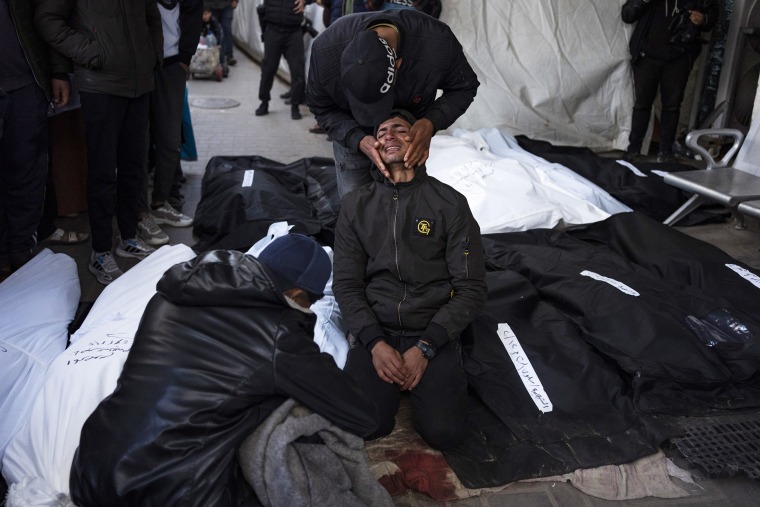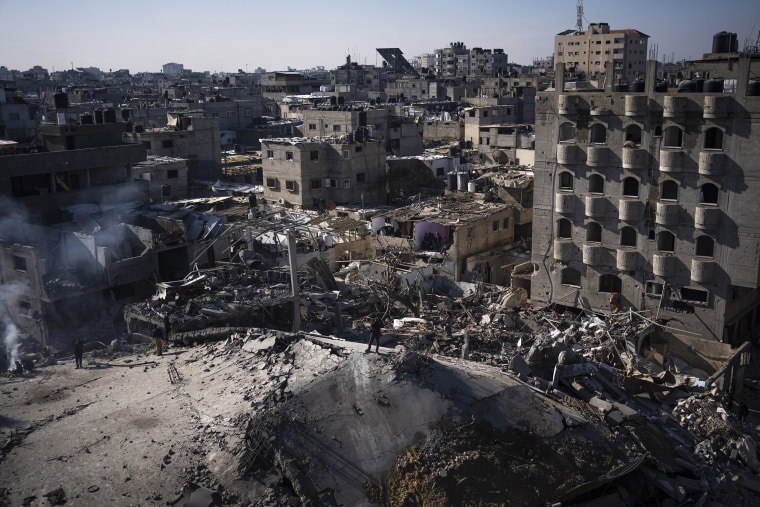LONDON — The Israel-Hamas war in Gaza has now killed at least 30,000 people, the Palestinian Health Ministry announced Thursday, a swelling death toll that has already drawn condemnation internationally, isolated Israel and prompted dismay from its traditional friends and allies.
Though the U.S. says a cease-fire may be near, the military campaign looks far from over. Having swept through swaths of northern and central Gaza, Israel has signaled its intention to attack Rafah, the enclave’s southernmost city where an estimated 1.4 million people are sheltering in squalid conditions.
Some 70% of the dead Palestinians are women and children, according to figures published by the Palestinian Health Ministry. And while many lawyers agree Hamas’ Oct. 7 attack on Israel was a war crime, Israel too has been accused by rights watchdogs and United Nations officials of breaking international law in its response.
“Nothing can justify” Hamas’ “deliberate killing, injuring, torturing and kidnapping of civilians, the use of sexual violence, or the indiscriminate launching of rockets towards Israel,” U.N. Secretary-General António Guterres said in a speech Monday. “But nothing justifies the collective punishment of the Palestinian people.”
“International humanitarian law remains under attack,” he said. And “tens of thousands of civilians, including women and children, have been killed.”
American and U.N. officials say the death toll given by Palestinian officials is at least accurate and perhaps an undercount. Aid workers on the ground say that thousands more people could still be trapped under the rubble. In addition some 70,000 people have been wounded, and 1.7 million — or 80% of the population — has been displaced, according to Gazan health officials and U.N. estimates.

Around 60% of the residential buildings in Gaza have been damaged and 45% have been destroyed altogether, according to a report last month by the World Bank that used satellite images.
“This isn’t just a question of the number of Palestinians killed; this is much bigger than that,” said Diana Buttu, the former legal adviser to Palestinian President Mahmoud Abbas. “The world has failed Palestinians.”
Israel says it’s only interested in trying to root out Hamas following its Oct. 7 attack, in which some 1,200 people were killed and around 240 kidnapped, according to the Israeli government. According to the Israeli military, 576 Israeli soldiers have been killed since Oct. 7 — 237 of them since the ground offensive began Oct. 27.
The Israeli military says it is doing everything possible to avoid civilian casualties, including dropping leaflets, attempting to evacuate conflict areas and creating so-called “safe zones’’ inside Gaza. Israeli officials blame the death toll on Hamas using civilians as “human shields,” as well as the group’s failure to release the 134 hostages believed still in Gaza.
“Hamas declared war on Israel on Oct. 7 and Israel had to respond,” said Aviv A. Oreg, a veteran reservist in the IDF’s military intelligence branch where he has held multiple senior roles. “I think we’ve done much, much better within the framework of humanitarian issues than others did,” he added, comparing Israel’s efforts favorable to those by the U.S. in Afghanistan, or the Western Allies in World War II. “I didn’t see them creating safe zones in Dresden,” he said.
Hamas is deemed a terrorist group by the U.S., and most if not all international law experts say its Oct. 7 assault constituted a war crime. But in its response, Israel, too, has been accused by watchdogs, such as Human Rights Watch, and some senior U.N. officials of breaching international law. South Africa has engaged a legal case at the International Court of Justice alleging that Israel is guilty of genocide against the Palestinians, something Israel vehemently denies.
Dozens of Gazans interviewed by NBC News since the start of the conflict say they believe Israel’s ultimate aim is to drive them out of Gaza so that it can be settled by Israelis, as is happening in the West Bank, another territory Palestinians hope will be part of a future state.
Israeli Prime Minister Benjamin Netanyahu has repeatedly denied this is his government policy. But other members of his coalition, the most right wing in Israel’s history, have suggested as much.
That, coupled with the relentlessness of Israel’s campaign, is proof enough for Palestinians who say that this is not just about targeting Hamas.
“These deliberately random attacks say one thing to me — that this is really a plan to carry out collective punishment, which is a war crime,” said Musheir El-Farra, 62, a Palestinian filmmaker and rights activist. “It’s a crime in front of our eyes and the whole world is watching.”
He spent six weeks in Gaza at the start of the conflict, and although, as a British national, he managed to flee to England, he says more than 100 of his relatives have been killed.

“We are witnessing the destruction of anything and everything,” he said. “They continue to destroy town after town, city after city.”
The next such population center looks set to be Rafah. Israel has drawn up plans to attack the city and evacuate both its residents and the people who have fled there from elsewhere.
Two Israeli officials told NBC News on Monday that Palestinian civilians sheltering in Rafah will be allowed to flee to other areas of southern Gaza but not be allowed to return to their homes in the north. With Gaza already one of the most densely populated places on Earth, that’s led many to question where these people are supposed to go.
The White House has warned Israel that it was opposed to an attack on Rafah without “a credible and executable plan” to get civilians out of harm’s way. It was not clear if the Israeli proposals to move civilians into other parts of southern Gaza would meet that American benchmark.
“The operation in Rafah, it’s going to have a lot of consequences,” said Shahin Berenji, an assistant professor at the U.S. Naval War College in Rhode Island. “I’m not sure how you go about relocating 1.5 million people in the span of a week. I think there are a lot of unanswered questions.”
Meanwhile, President Joe Biden is facing domestic political pressure from critics who are dismayed at Washington’s continued military support of Israel, which receives more than $3 billion in military aid from Washington every year.
Biden and his officials have grown increasingly critical of Israel’s war, but nevertheless the U.S. has been accused of giving “Israel the greenest of green lights” to attack Gaza, according to Buttu, who was a spokesperson for the Palestine Liberation Organization in the 2000s.
On Monday, Biden said he hopes there will be a cease-fire by next week. But Israeli Defense Minister Yoav Gallant reiterated that such a pause would not stop Israel “continue fighting until the very last hostages return.”
For Palestinians such as El-Farra, any respite to the violence must be accompanied by a long-term plan for their future, something on which Israel and Washington also remain divided.
“As someone whose heart is bleeding for my people, I would love to see a cease-fire,” El-Farra said. “But I don’t want to see a cease-fire that will give people a little bit of hope, only for the fighting to resume in six weeks.”

